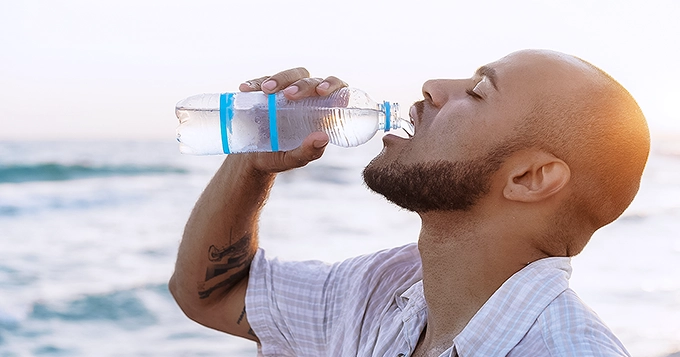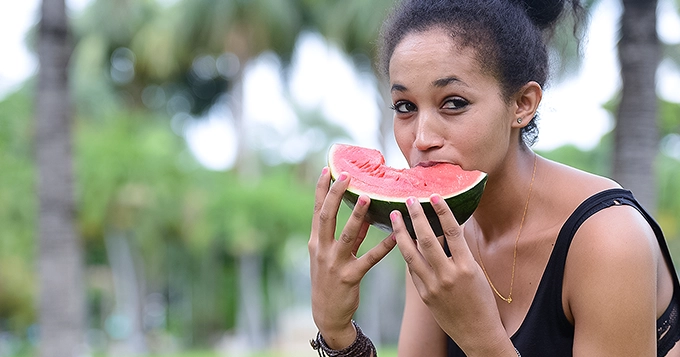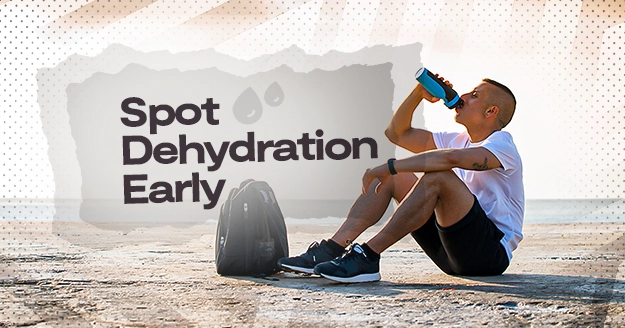What is dehydration?
Dehydration occurs when your body lacks the necessary fluid to function properly, which can result from factors like sweating, diarrhea, or vomiting. It can range from mild to severe depending on the amount of fluid lost.
What are the causes of dehydration?
Dehydration can occur due to different factors, including:
- Inadequate Fluid Intake: Not drinking enough fluids throughout the day, especially in a hot day or during physical activity, can lead to dehydration.
- Excessive Sweating: Intense physical activity, high temperatures, or fever can cause excessive sweating, leading to fluid loss and dehydration.
- Diarrhea: Diarrhea can result in significant fluid and electrolyte loss, especially if it persists for an extended period.
- Vomiting: Continuous vomiting can lead to dehydration by causing your body to quickly lose fluids and electrolytes.
- Increased Urination: Certain medical conditions like diabetes or medications such as diuretics can increase urine output, resulting in dehydration if fluid intake is not adequately maintained.
- Fever: High fever can cause increased sweating and fluid loss, contributing to dehydration if fluid intake does not match the body’s needs.
- Alcohol Consumption: Alcohol is a diuretic. This means it increases urine production, potentially leading to dehydration, particularly if consumed in large quantities without adequate water intake.
- Certain Medical Conditions: Some medical conditions like kidney disease, adrenal gland disorders, or severe burns can impair the body’s ability to retain fluids, increasing the risk of dehydration.
- Environmental Factors: Hot and dry climates, high altitudes, or spending prolonged periods in the sun without adequate hydration can accelerate fluid loss and dehydration.
What are the signs and symptoms of dehydration?
Not every time is thirst a good way to tell when the body needs water. Many people, especially elderly ones, don’t realize they’re thirsty until they’re actually dehydrated. For this reason, it’s crucial to drink more water when it’s hot outside or you’re sick.
The signs and symptoms of dehydration vary depending on age.
For infants or young children:
- Dry mouth and tongue
- Absence of tears while crying
- Lack of wet diapers for three hours or less than 6 wet diapers a day
- No wet diapers or no peeing for 8 hours for toddlers
- Sunken eyes and cheeks
- A depressed soft spot on the top of the skull
- Sleeplessness
- Listlessness or irritability
- Dry or wrinkled skin
- Deep rapid breathing
- Cool, blotchy hands and feet
For adults:
SIgn of mild or moderate dehydration include:
- Intense thirst
- Dry or sticky mouth
- Reduced frequency of urination
- Urine appears dark in color
- Dry, cool skin
- Fatigue
- Headache
- Muscle cramps
- Dry cough
- Low blood pressure
- Loss of appetite or sugar cravings
- Flushed skin
- Swollen feet
- Chills
- Constipation
- Shriveled skin
- Lack of sweating
Signs of severe dehydration include:
- Not peeing
- Having very dark yellow pee
- Very dry skin
- Feeling dizzy
- Rapid heartbeat
- Rapid breathing
- Sunken eyes
- Sleepiness
- Lack of energy
- Confusion
- Irritability
- Fainting
Effects of Dehydration
Dehydration can indeed lead to complications if not addressed properly. If you fail to drink enough fluids or attempt to rehydrate too rapidly, it can result in several adverse effects, including:
- Electrolyte Imbalance
Replenishing fluids too quickly without adequate electrolyte replacement can disrupt the balance of vital minerals throughout your body, leading to electrolyte imbalances such as hyponatremia (low sodium levels) or hypernatremia (high sodium levels).
- Swelling of Cells
Rapid fluid intake can cause cells to swell due to the influx of water, leading to cellular edema and potential tissue damage, particularly in the brain (cerebral edema). - Water Intoxication
Drinking excessive amounts of water in just a short period can result in water intoxication, a condition known as hyponatremia – sodium levels in the blood becoming dangerously diluted. - Gastrointestinal Distress
Overconsumption of fluids, especially cold or sugary beverages, can overwhelm the digestive system and lead to gastrointestinal discomfort, bloating, and diarrhea. - Cardiac Strain
Severe dehydration followed by rapid rehydration can place strain on the cardiovascular system, potentially leading to abnormal heart rhythms, heart palpitations, or even cardiac arrest in extreme cases.
Other complications include:
- Heat exhaustion or heatstroke
- Seizures
- Kidney failure
- Coma
- Shock
- Brain swelling
- Low blood volume shock
Ignoring signs and symptoms of dehydration can be fatal.
How much water to stay hydrated?
The food we consume accounts for about 20% of our daily fluid consumption, with the remaining 80% coming from the liquids we drink.
According to recommendations from the U.S. National Academies of Sciences, Engineering, and Medicine, men are advised to consume around 3.7 liters (approximately 16 cups) of fluid per day, while women should aim for about 2.7 liters (around 11 cups). It is vital to note that your fluid needs may increase if you engage in physical activity, experience sweating, or suffer from an illness such as diarrhea, vomiting, or fever.
Tips to Hydrate
- Drink a glass of water first thing in the morning.
Doing this increases your metabolism and provides you with more energy. If you have trouble with nighttime urination or heartburn, stay away from drinking water just before bedtime.
- Invest in a fun water bottle.
Having a visually appealing bottle that you enjoy using makes the act of hydrating feel more enjoyable and engaging. Plus, having your water readily accessible in a stylish container can serve as a constant reminder to stay hydrated, motivating you to sip on water regularly and meet your daily hydration goals effortlessly.
- Set reminders.
One of the best tips on how to stay hydrated is to set alarms on your phone or computer to remind you to drink water regularly throughout the day. These reminders can be scheduled at strategic intervals, such as every hour or two, to ensure you stay consistently hydrated.
You can also use apps specifically designed for hydration tracking, which send notifications and reminders based on your hydration goals and progress. By incorporating these reminders into your daily routine, you’ll be more likely to stay mindful of your water intake.
- Set a daily goal and make it a challenge.
Set a daily hydration goal to drink a certain amount of water each day, gradually increasing it towards the recommended upper limit over time to challenge yourself. Start with a manageable goal, such as eight glasses of water per day, and aim to exceed this target gradually as you become accustomed to increased hydration.
- Pay attention to your body’s signals.
Pay attention to your body’s signals to gauge your hydration levels. Signs and symptoms of dehydration include thirst, dry mouth, dark urine, fatigue, and headaches. Conversely, feeling energized, having clear urine, and experiencing fewer headaches are indicators of proper hydration.
You can better understand your body’s hydration requirements and modify your water intake by paying attention to these cues.
- Drink a glass of water before eating each meal.
Our sixth tip is one of the best way to stay hydrated. This simple practice not only helps you stay hydrated but also aids in portion control by helping you feel fuller before you start eating. Drinking water before meals can also promote better digestion and nutrient absorption.
- Drink with Snacks.
Drinking water alongside snacks can help you feel more satisfied and prevent overeating, as thirst is usually mistaken for hunger.
- Flavor your water.
Add slices of cucumber, lemon, berries, or mint to your water for a refreshing and flavorful twist. To make filling your water bottle easier in the morning, prepare a jug in the refrigerator to infuse overnight. Grab a water bottle with an integrated infusion basket to enjoy flavor on the fly.
- Swap high-sugar drinks for sparkling water.
Sparkling water provides the fizz and refreshment of soda without the added sugars and calories. Enjoying sparkling water or seltzer instead of sugary beverages can help reduce your overall sugar intake, support weight management, and promote better hydration.
- Monitor the color of your urine.
Ideally, your urine should be pale yellow in color, similar to the color of straw. Darker urine may indicate dehydration, while clear urine could suggest overhydration. You can make sure you remain properly hydrated by adjusting your water consumption based on the color of your pee.
- Eat hydrating foods.
Incorporate hydrating foods like cucumbers, watermelon, oranges, strawberries, and lettuce into your diet to boost hydration. These foods are rich in water content, helping you stay hydrated and promoting overall health.
- Be Mindful During Exercise.
Hydrate before, during, and after exercise by drinking water or sports drinks to replenish fluids lost.








